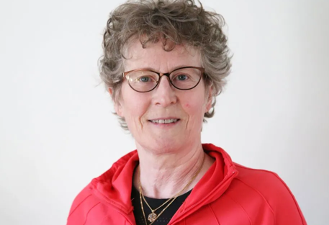Dr. Elaine Blacklock reflects on her planetary health work, offers practical steps to aspiring climate leaders
Posted on April 17, 2024
In 2015, Dr. Elaine Blacklock wanted to get involved in climate action but wasn’t sure how she could make a difference. Times have changed for the Sudbury pediatrician and NOSM University Assistant Professor, who is now NOSM University’s planetary health lead, the Chair of the Action on Climate Change Committee, and a columnist with the Sudbury Star.
“I think about climate change as a parent, and I think about it as a pediatrician,” Dr. Blacklock says. “My patients are young. We, as a society, think it’s right and good to invest money, time, and effort in their health care, yet we send them into a world that’s increasingly unhealthy. I have a deep sense of reverence for nature and for life, for making things thrive and grow. I think this reverence is probably why planetary health has become my big life project.”
Planetary health means more than caring about the environment: it focuses on the intimate connection between the health of the planet and human health. The earth’s water, atmosphere, temperature, precipitation, and biodiversity—among other environmental factors—impact health and wellbeing at the community and individual level.
For Dr. Blacklock, re-thinking the concept of “do no harm” is central to planetary health. She reflects, “In an era of global environmental crises, when climate change is undoubtedly impacting people’s health, what does it mean to ‘do no harm?’ We tend to think about ‘do no harm’ as applying to the patient in front of us, but there are a lot of ways to do harm. We participate in a health-care system that is responsible for 4-5% of greenhouse gases (GHGs) and a sizeable portion of waste. Our health-care system is causing harm, and that should be a values issue for physicians.”
Of the 4-5% of GHGs for which the health-care system is responsible, many are difficult for physicians to control. For instance, the biggest contributors are heat, air conditioning, and electricity for infrastructure, followed by procurement of medical equipment, supplies, and pharmaceuticals, which often come from overseas.
But other contributors to GHGs are closely aligned with clinical decisions. For instance, nitrogen dioxide—also known as laughing gas—is a powerful GHG. GHGs are also found in some inhalers. And medical tests, treatments, and prescriptions all have environmental impacts, so reducing unnecessary interventions is good for both the patient and the planet.
NOSM University is working to integrate planetary health into its medical curriculum, placing these issues at the forefront.
“It’s about educating learners to be wise stewards of investigation and treatment, which is good for patients, health-care costs, and sustainability,” says Dr. Blacklock. “It’s not about replacing good patient care with good environmental care; it’s about finding co-benefits and synergies.”
Practising medicine with a planetary health lens integrates these co-benefits into patient care, says Blacklock. “As physicians, we can emphasize the dramatic overlaps between what’s good for our patients and for the planet. For instance, if you eat according to Canada’s Food Guide, with less meat, plenty of fruits and vegetables, and some plant-based sources of protein, it’s better for your health and it reduces your carbon footprint. If you use active transportation to get to school or work, you will reduce your emissions and get a lot of exercise. And there’s lots of momentum for physicians to prescribe nature. Time in nature has a wide array of positive physical and mental health benefits, including reducing blood pressure and stress, and it also increases our sense of connection to nature and the likelihood of protecting nature.”
Dr. Blacklock recognizes the efforts of the committee’s members and thanks Dr. Sarita Verma, President, Vice-Chancellor, Dean, and CEO for establishing and supporting NOSM University’s Action on Climate Change Committee—including, importantly, signing the AFMC’s Declaration on Planetary Health.
Read more about the committee’s work and their upcoming Earth Day celebration, which will be held on April 22.


